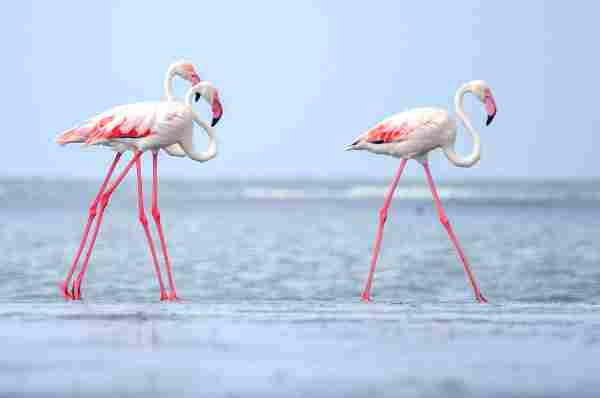Do you feel bored with the conventional choices for pets? Maybe you have contemplated the idea of having an exotic pet like a flamingo? These graceful birds, with their striking pink plumage, are unquestionably charming, and it’s not unusual for people to ponder over the legality of keeping them as pets.
Table of Contents
Is it Possible to Keep a Flamingo as a Pet?

It is not permissible to have a flamingo as a pet due to the Migratory Bird Act, which safeguards them. The act prohibits the captivity of flamingos without proper authorization. Even if you fulfil all the requirements for documentation, obtaining permission to have one as a pet is improbable as an individual.
Another reason to avoid keeping a flamingo as a pet, particularly for inexperienced individuals, is their special needs and care requirements. Knowledgeable flamingo keepers strongly advise against having just one, as they are very social birds, and it is better to have a larger flock. It is recommended to have at least ten flamingos in a vast area with nesting spaces and adequate sunlight.
Moreover, flamingos are tropical creatures and require warm temperatures to thrive. If you reside in a region with a colder climate than their natural habitat, you must provide special housing for them.
Can Flamingos be Owned Legally?
The legality of keeping a flamingo as a pet varies depending on the country or jurisdiction. Nevertheless, in most parts of the world, owning a flamingo as a pet without the appropriate licenses and permits is prohibited. Wildlife laws protect flamingos, and many regions have strict regulations to prevent their capture and trade.
In the United States, flamingos are considered migratory birds, and they receive protection under the Migratory Bird Treaty Act. It is illegal to capture, sell, or possess them without proper permits and licenses issued by the U.S. Fish and Wildlife Service. Therefore, it is not advisable to attempt to capture a wild flamingo as it can be hazardous and may result in legal consequences.
Should You Consider Flamingos as Pets?
In addition to the legal considerations, various factors make flamingos unsuitable as pets.

Specialized Care is Required for Flamingos
Have you ever wondered how flamingos achieve their striking pink hue? In the wild, the pigments from their diet contribute to their recognizable colour. Flamingos primarily consume red algae, insects, larvae, and shrimp, all of which are rich in beta-carotene. This pigment is then absorbed by their face, legs, and feathers.
This diet is unique, and it can be challenging to replicate in captivity. As a result, their vibrant colour and overall health may be at risk. Furthermore, flamingos evolved to live in warm, tropical regions, making it difficult, if not impossible, to simulate these conditions in captivity.
Social Nature of Flamingos
As you are aware, flamingos reside in flamboyance, which are substantial groups of birds. They typically assemble in flocks of approximately 70 birds. It is not feasible to have just one flamingo in your yard. Being highly social creatures, solitary flamingos may experience stress and health issues, including depression, feather plucking, and even death.
As you can infer from the previous information, even owning a single flamingo requires a considerable amount of effort. Therefore, it is needless to say that keeping a pair of flamingos would be quite demanding.

Considerations of Ethics
Flamingos are wild animals that should be allowed to reside in their natural habitats. Capturing and confining them can be both unethical and cruel, resulting in both physical and psychological harm.
Flamingos should be admired and appreciated in their natural surroundings, where they can live freely and display their natural behaviours. When kept in captivity, flamingos are prevented from engaging in activities they have evolved to do, such as swimming in aquatic habitats, gathering in groups, and raising offspring.
Additionally, the capture of wild flamingos can have detrimental consequences on their populations as a whole.
How Expensive Is It to Buy a Flamingo?
Owning a flamingo can be a costly endeavour, with a single bird costing between $2,500 and $4,500. But the expenses don’t stop there. Since flamingos are social creatures, it’s necessary to buy an entire flock, which quickly becomes a substantial financial investment.
Creating a home environment that mimics the natural habitat of flamingos is also a significant expense. Regular avian equipment won’t suffice; instead, you’ll need to build a habitat specifically designed for flamingos that includes a large saltwater pond and a net enclosure to keep the birds from flying away.
In addition to the initial investment, the cost of feeding your flamingos can be high since they require a specialized diet consisting mainly of seafood. Moreover, you’ll need to have money to pay for permits, licenses, and experienced exotic pet veterinarians.
Overall, owning a flamingo demands a significant investment of both time and money, making it nearly impossible for most people.

Can Flamingos be Considered Friendly towards Humans?
Flamingos are not typically aggressive towards humans, but their level of “friendliness” can vary depending on the circumstances. In the wild, they do not actively seek out human interaction as domesticated pets might. However, they may approach humans if they are curious or accustomed to being fed by them.
In many zoos, flamingos are free to roam in areas where they can interact with people. Despite their powerful beaks and sharp claws, they are generally peaceful towards humans. However, this does not mean that they enjoy being touched or petted by visitors. It’s important to remember that flamingos are wild animals and should be treated as such.
FAQs
Do flamingos recognize humans?
Flamingos cannot recognize humans in the same way that domesticated pets such as dogs and cats can. However, in certain circumstances, such as in zoos where they may become accustomed to human presence and feeding, they may become more familiar with humans and approach them out of curiosity.
How long do flamingos live?
Flamingos have a long lifespan, and their average life expectancy in the wild is about 20-30 years. However, flamingos in captivity can live even longer, up to 50 years or more.
Is A flamingo A Boy or a girl?
It can be difficult to tell the sex of a flamingo just by looking at them, as males and females have very similar physical characteristics. However, some subtle differences can be observed, such as the size and shape of their beaks and the brightness of their plumage. In general, males tend to be slightly larger and have more colourful feathers than females.
Is a flamingo friendly?
Flamingos are generally not considered “friendly” in the same way that domesticated pets are. In the wild, flamingos do not seek out human interaction and may only approach humans out of curiosity or if they are accustomed to being fed by humans.
Do blue flamingos exist?
No, blue flamingos do not exist in reality. Flamingos are known for their distinctive pink colour, which comes from the pigments in the food they eat. While some species of flamingos have more vibrant pink hues than others, there are no known species of blue flamingos.
FinalWords
it’s not advisable or ethical for most individuals to keep flamingos as pets due to legal and moral reasons. Despite being striking and elegant with their pink plumage, flamingos require particular attention and an environment that is challenging to simulate in captivity. If you’re looking for legal birds to keep as pets and easier to care for, consider getting a pair of geese instead.
Reference:
https://seaworld.org/animals/all-about/flamingos/characteristics/
https://www.audubon.org/news/flamingos-can-forge-long-lasting-friendships-and-rivalries
https://nationalzoo.si.edu/animals/news/why-are-flamingos-pink-and-other-flamingo-facts

Jeevan Kodiyan
An animal enthusiast with an interest in zoology, studying the behavior and activities of animals in the wild habitat. I work on research projects related to species conservation and endangered species protection. I also leverage zoology to become an educator, educating others about the importance of protecting our natural environment and the beauty of animals in their natural habitats.









